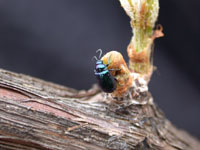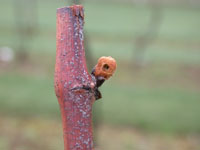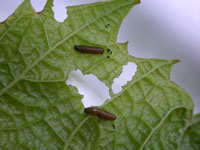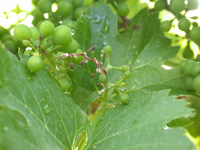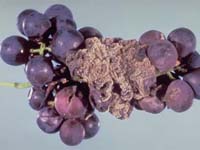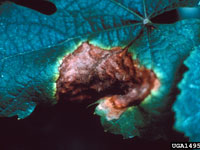Extension > Garden > Diagnose a problem > What's wrong with my plant? > Fruit > Grape > Brown or black, dried out
Grape > Buds > Brown or black, dried out
1 of 3
Grape Flea Beetle
- Feeding by beetles results in a small (slightly larger than a pin head) hole on the sides and ends of the newly developing grape buds
- Adult beetles are present in the early spring (April through May)
- Small insects, approximately 1/10 inch long, shiny, with enlarged hind legs used for jumping
- Range in color from blue-purple to blue-green
- More information on Grape Flea Beetle
2 of 3
Botrytis
Botrytis cinerea
- Berries become soft and watery, and may be covered in a fuzzy white-gray mold
- White grapes will start to turn brown while purple grapes turn reddish in color
- Berries that have been infected for several days will shrivel and drop to the ground as hard mummies
- Multiple berries in a cluster can be infected
- Leaves have large, red-brown patches; a gray mold may or may not be observed on the leaf
- More information on Botrytis
3 of 3
Climbing Cutworms
- Cutworm feeding on buds results in either half or the entire bud being severed, with the remainder of the bud becoming dried out
- Cutworms are present in early spring (late April through May)
- Dingy cutworm larvae are pale gray to brown, and tinged with red
- Variegated cutworms are dark-colored with yellowish diamond-shaped spots on top of its body. Both cutworm grow up to 1½ to two inches long
- More information on Climbing Cutworms



